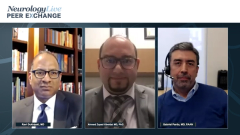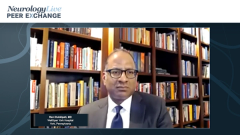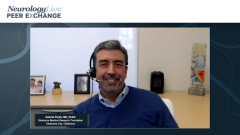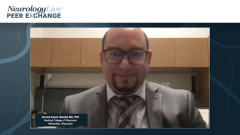
Recommendations for RRMS Management
Ahmed Zayed Obeidat MD, PhD; Ravi Dukkipati, MD; and Gabriel Pardo, MD, FAAN, share key takeaways for clinicians treating RRMS.
Episodes in this series

Ahmed Zayed Obeidat MD, PhD: Dr Dukkipati, what advice would you give to our colleagues treating people with MS [multiple sclerosis]? What would be some general advice you would give, and then Dr Pardo, I’ll come back to you.
Ravi Dukkipati, MD: My general advice to newer colleagues in the arena of multiple sclerosis would be to please treat early, treat effectively, and treat safely. We have wonderful options now that offer that great balance of high efficacy with safety, and take an optimistic approach and partner with patients. Present to patients that we have effective treatments, but they’re most effective if initiated early rather than later. Also, monitor patients routinely and closely, and try not to drop the ball; stay involved and keep an eye out.
This is a very exciting time because I have often been picking the brains of colleagues in terms of with BTKis [Bruton tyrosine kinase inhibitors], for example, where we will put them, how will we sequence them with our available drugs? We have a wonderful array of highly effective options right now. It’s only going to get better. Coming back to the advice to share with clinicians, I think the No. 1 thing would be to treat effectively, treat early.
Ahmed Zayed Obeidat MD, PhD: That was very well said, Dr Dukkipati. Dr Pardo?
Gabriel Pardo, MD, FAAN: I could not agree more. I think the only thing to complement that is to avoid treatment inertia. You have to be on the lookout for things that are not going well, and not just assume that because I put them on a treatment, that’s it, and tolerate the 1, or 2, or 3 relapses or the 2 or 3 new MRI lesions and say you’re getting treatment. You need to move on, you need to adapt, you need to modify.
The second component to add to that is that we need to again approach MS comprehensively. These patients have a lot of manifestations, a lot of deficits, and the disease-modifying therapy is certainly the cornerstone of the therapy. We need to do that, but we need to pay attention to all the other manifestations and address those through very nice symptomatic management to improve the quality of life of these patients. They deserve it. We need to give it to them.
Ahmed Zayed Obeidat MD, PhD: It’s teamwork, right? I tell patients “You’re the captain, we’re all working around you, we’re all working as a team: the urologist, the ophthalmologist, the rehab specialist, speech therapist, everyone, pharmacists, nurses.” Everyone is working hard to help and make sure the patient’s needs are attended to. It’s OK to have breakthrough disease. We can always switch. We can always escalate, so don’t be afraid of monitoring because we’re not going to do an MRI or we’re not going to see patients in the clinic. We have to make sure we’re on top of monitoring, and also not compromising safety. You mentioned also de-escalation at some point. When we see that things are under good control and maybe it’s time to help the immune system have some recovery, then that’s the time to de-escalate. Even when we de-escalate, we have to be closely monitoring, very vigilant about any change that may happen.
This has been a great discussion. I enjoyed it and learned a lot, and I hope our audience thought that as well. I would like to thank you both, Dr Dukkipati and Dr Pardo. And thank you again to our viewing audience. We hope you found this NeurologyLive®Peer Exchange discussion to be useful and informative. If you enjoyed the content, please subscribe to our e-newsletter to receive upcoming peer exchanges and other great content right to your inbox. Thank you very much, everyone.
Transcript edited for clarity
Newsletter
Keep your finger on the pulse of neurology—subscribe to NeurologyLive for expert interviews, new data, and breakthrough treatment updates.














